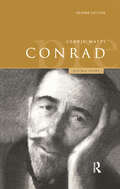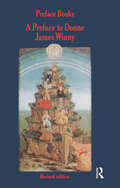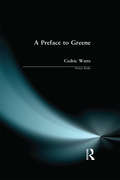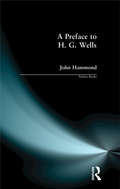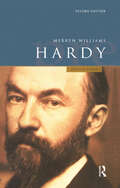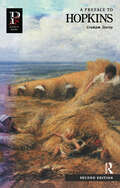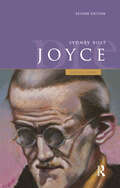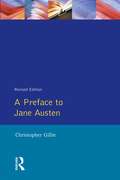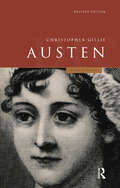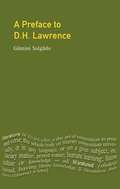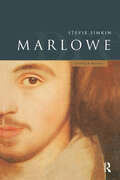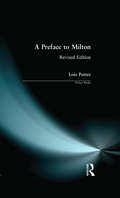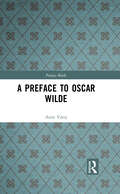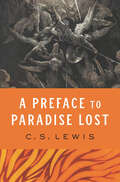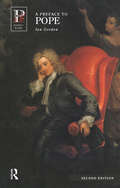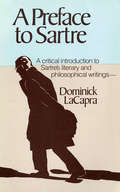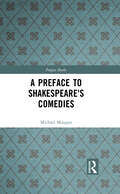- Table View
- List View
A Preface to Conrad: Second Edition (Preface Books)
by Cedric, M.A. WattsWidely recommended, this guide to Conrad offers a vivid and incisive account of his life and literary career, and gives detailed attention to the contexts, themes, problems and paradoxes of his works.
A Preface to Donne (Preface Books)
by James WinnyProbably the most famous of the Metaphysical poets, John Donne worked with and influenced many of the leading poets of the age. This excellent introduction to his life and works sets his writing firmly in the context of his times.
A Preface to Donne (Preface Books)
by James WinnyProbably the most famous of the Metaphysical poets, John Donne worked with and influenced many of the leading poets of the age. This excellent introduction to his life and works sets his writing firmly in the context of his times.
A Preface to Ezra Pound (Preface Books)
by Peter WilsonProvides an introduction to the life and works of Ezra Pound, a major modernist poet, theorist and literary critic. Throughout his life Pound was regarded by many to be a contentious and controversial figure, and since his death in 1972, theoretical, literary, political and biographical comentators have done much to perpetuate this view. Peter Wilson's survey, however, presents a balanced view of his life and work allowing the reader to judge for themselves. The major sections of the book offer introductions to the complex life and work of Pound, outlining the various cultural, political and literary issues which are important to a full understanding of his place in twentieth century English literature. Critical commentaries are then given on all of Pound's major poetry, adopting some analytical techniques from stylistics. Brief biographies of important figures in Pound's career, and in the development of literary modernism are provided. A gazeteer, glossary, and suggestions for further reading complete the book.
A Preface to Greene (Preface Books)
by Cedric, M.A. WattsLively, informed and thorough, this survey of the life and works of Graham Greene opens with a biographical account setting the writer in context of his times and describing and exploring the influences, tensions and contradictions that occur throughout his work. The second half of the book devotes itself to the 'art of Greene' discussing his writing techniques, recurring themes, and imaginative preoccupations. Within this section thorough critical analyses are given of three works: Brighton Rock, The Power and the Glory, and the film, The Third Man. The book concludes with a reference section which comprises a gazeteer, a biographical list and a bibliography. Suggestions for further reading and a list of films encourage the student to explore the works of Greene more widely.
A Preface to H G Wells (Preface Books)
by John R. HammondJohn Hammond offers an introduction to the life and work of H G Wells which is of interest and value to both the student and the general reader. Although Wells is studied at undergradute level there is no introductory text available as yet, instead students can only consult full length detailed biographies. John Hammond provides a concise overview allowing the student to read Wells with greater critical appreciation and to undertand the main areas of discussion and disagreement concerning the author.
A Preface to Hardy: Second Edition (Preface Books)
by Merryn WilliamsA Preface to Hardy remains the best introduction to one of the most important and popular writers in English literature. The first section concentrates on Hardy the man and outlines the intellectual and cultural context in which he lived. The author then moves on to examine a wide range of Hardy's work, with particular reference to The Mayor of Casterbridge. There is new material on Hardy's short stories and their relation to the major novels, and on The Dynasts, which accompanies a study of a range of Hardy's other poetry.
A Preface to Hardy: Second Edition (Preface Books)
by Merryn WilliamsA Preface to Hardy remains the best introduction to one of the most important and popular writers in English literature. The first section concentrates on Hardy the man and outlines the intellectual and cultural context in which he lived. The author then moves on to examine a wide range of Hardy's work, with particular reference to The Mayor of Casterbridge. There is new material on Hardy's short stories and their relation to the major novels, and on The Dynasts, which accompanies a study of a range of Hardy's other poetry.
A Preface to Hopkins (Preface Books)
by Graham StoreyAn authoritative guide to the life and works of Hopkins, for those who require a good introduction from which to explore the author's works more fully.
A Preface to Hopkins (Preface Books)
by Graham StoreyAn authoritative guide to the life and works of Hopkins, for those who require a good introduction from which to explore the author's works more fully.
A Preface to James Joyce: Second Edition (Preface Books)
by Sydney BoltThis new edition includes material on Joyce's distinctive view of femininity and a greatly expanded treatment of Finnegan's Wake. The first section outlines the biographical and cultural background, the second offers a detailed critical survey of three major works, including Ulysses and Portrait of the Artist as a Young Man, and the third section provides valuable reference material.
A Preface to James Joyce: Second Edition (Preface Books)
by Sydney BoltThis new edition includes material on Joyce's distinctive view of femininity and a greatly expanded treatment of Finnegan's Wake. The first section outlines the biographical and cultural background, the second offers a detailed critical survey of three major works, including Ulysses and Portrait of the Artist as a Young Man, and the third section provides valuable reference material.
A Preface to Jane Austen (Preface Books)
by Christopher GillieAn excellent introduction to one of the best known authors in English Literature.
A Preface to Jane Austen: Revised Edition (Preface Books)
by Christopher GillieJane Austen's satirical classical novels have made a lasting contribution to English literature and first gave the novel its distinctly modern character with the treatment of ordinary people in everyday life. Her works, such as Pride and Prejudice, Emma andMansfield Park, remain as popular today as they ever have been, both in book form and a screen adaptations. The Preface Books series approaches the work of Jane Austen from a particular perspective which, by introducing the writer via a biographical sketch and a survey of her cultural and social context, encourages readers to understand her work in the period and style it was written. Christopher Gillie's A Preface to Austen looks at Austen's life and literary background and their effect on her work. Using biographical information, it clearly sets her writing firmly in the context of her times and will be essential reading for anyone interested in the works of Austen.
A Preface to Jane Austen: Revised Edition (Preface Books)
by Christopher GillieJane Austen's satirical classical novels have made a lasting contribution to English literature and first gave the novel its distinctly modern character with the treatment of ordinary people in everyday life. Her works, such as Pride and Prejudice, Emma andMansfield Park, remain as popular today as they ever have been, both in book form and a screen adaptations. The Preface Books series approaches the work of Jane Austen from a particular perspective which, by introducing the writer via a biographical sketch and a survey of her cultural and social context, encourages readers to understand her work in the period and style it was written. Christopher Gillie's A Preface to Austen looks at Austen's life and literary background and their effect on her work. Using biographical information, it clearly sets her writing firmly in the context of her times and will be essential reading for anyone interested in the works of Austen.
A Preface to Lawrence (Preface Books)
by Gamini Salgado'Longman Preface books are intended to give "modern and authoritative guidance" on the lives and works of the major writers ... Gamini Salgado's A Preface to Lawrence does just that.' Times Educational SupplementD. H. Lawrence, criticised, censored and dismissed in his lifetime, now stands as one of the major imaginative novelists of the early twentieth-century.Clear, vivid and convincing, Gamini Salgado's introduction to the life and works of D H Lawrence, sets the writer firmly in the context of his times and:* outlines his life and intellectual background, and their effect on his writing * looks in detail at many of Lawrence's works, including Sons and Lovers, The Rainbow, his shorter fiction, poetry and plays * examines Lawrence as a literary critic * covers important people and places in Lawrence's life and their effect on himGamini Salgado was formerly Professor of English at Exeter University. His works include a book on Sons and Lovers (Arnold), an anthology of critisism of it (Macmillan) and a number of studies of drama and prose literature.
A Preface to Marlowe (Preface Books)
by Stevie SimkinThis study provides an authoritative overview of all Marlowe's work. It includes thorough investigations of his major plays, Tamburlaine, Edward II, The Jew of Malta and Doctor Faustus as well as a full discussion of The Massacre at Paris, Dido Queen of Carthage and all his extant poetry. Analysis of Faustus takes full account of both A and B text versions. Thoroughly researched and yet presented in an accessible, engaging style, A Preface to Marlowe reads Marlowe's life and times, as well as his work, in the light of current critical theory. Consequently, it is a vital guide for all students of early modern drama. As well as providing sharp analysis of stage history, Dr Simkin reflects on the wider significance of a stage-oriented approach. The result is a reading of Marlowe that re-opens debates about his status as a radical figure and as a subversive playwright and invites the reader to experience the plays as immediate, exciting, 'live' documents.
A Preface to Marlowe (Preface Books)
by Stevie SimkinThis study provides an authoritative overview of all Marlowe's work. It includes thorough investigations of his major plays, Tamburlaine, Edward II, The Jew of Malta and Doctor Faustus as well as a full discussion of The Massacre at Paris, Dido Queen of Carthage and all his extant poetry. Analysis of Faustus takes full account of both A and B text versions. Thoroughly researched and yet presented in an accessible, engaging style, A Preface to Marlowe reads Marlowe's life and times, as well as his work, in the light of current critical theory. Consequently, it is a vital guide for all students of early modern drama. As well as providing sharp analysis of stage history, Dr Simkin reflects on the wider significance of a stage-oriented approach. The result is a reading of Marlowe that re-opens debates about his status as a radical figure and as a subversive playwright and invites the reader to experience the plays as immediate, exciting, 'live' documents.
A Preface to Milton: Revised Edition (Preface Books)
by Lois PotterA highly readable and illustrated introduction to the work of Milton, which provides both a biographical account of the poet and his influences, and a critical survey of his poetry.
A Preface to Oscar Wilde (Preface Books)
by Anne VartyA Preface to Oscar Wilde provides a detailed study of the cultural, personal and political influences that shaped Wilde's writing. The study concentrates primarily on his fiction, critical dialogues and plays that were published between 1890 and 1895, and detailed accounts of Wilde's lesser known works such as his poetry, journalism and letters are also presented. The first section places his work in a variety of cultural contexts: Wilde's family life and his Irish inheritance are examined, the impact of his sexuality on his writing and reputation is considered, and a description is provided of how Wilde became a legendary figure in the arts. Major innovations and successes, such as The Picture of Dorian Gray, Salome and The Importance of Being Earnest are related to avant garde movements of their day such as aestheticism, decadence, and symbolism. Reference sections provide supporting material such as a Wilde chronology, a glossary of terms and a bibliography for further study. Anne Varty sets out in this study to bring to life the work of Wilde, and to make his writing accessible to readers who are unfamiliar with his achievements. In so doing, she confronts the ethical drive of his work, and demonstrates the coherent evolution of his work from the aestheticism of the early poetry, through the sophisticated handling of theatre, to the dark self-scrutiny of autobiography. The comprehensive and accessible approach makes this a useful reference work to all who are studying Oscar Wilde, both at A Level and undergraduate level. The content will also appeal to the general reader who is seeking to gain a greater understanding and appreciation of Wilde's work.
A Preface to Oscar Wilde (Preface Books)
by Anne VartyA Preface to Oscar Wilde provides a detailed study of the cultural, personal and political influences that shaped Wilde's writing. The study concentrates primarily on his fiction, critical dialogues and plays that were published between 1890 and 1895, and detailed accounts of Wilde's lesser known works such as his poetry, journalism and letters are also presented. The first section places his work in a variety of cultural contexts: Wilde's family life and his Irish inheritance are examined, the impact of his sexuality on his writing and reputation is considered, and a description is provided of how Wilde became a legendary figure in the arts. Major innovations and successes, such as The Picture of Dorian Gray, Salome and The Importance of Being Earnest are related to avant garde movements of their day such as aestheticism, decadence, and symbolism. Reference sections provide supporting material such as a Wilde chronology, a glossary of terms and a bibliography for further study. Anne Varty sets out in this study to bring to life the work of Wilde, and to make his writing accessible to readers who are unfamiliar with his achievements. In so doing, she confronts the ethical drive of his work, and demonstrates the coherent evolution of his work from the aestheticism of the early poetry, through the sophisticated handling of theatre, to the dark self-scrutiny of autobiography. The comprehensive and accessible approach makes this a useful reference work to all who are studying Oscar Wilde, both at A Level and undergraduate level. The content will also appeal to the general reader who is seeking to gain a greater understanding and appreciation of Wilde's work.
A Preface to Paradise Lost
by C. S. LewisC. S. Lewis’s illuminating reflections on Milton’s Paradise Lost, the seminal classic that profoundly influenced Christian thought as well as Lewis’s own.In Preface to Paradise Lost, the Christian apologist and revered scholar and professor of literature closely examines the style, content, structure, and themes of Milton’s masterpiece, a retelling of the biblical story of the Fall of Humankind, Satan’s temptation, and the expulsion of Adam and Eve from the Garden of Eden. Considering the story within the context of the Western literary tradition, Lewis offers invaluable insights into Paradise Lost and the nature of literature itself, unveiling the poem’s beauty and its wisdom.Lewis explains and defends the literary form known as “Epic,” pondering simple yet perceptive questions such as: What is an Epic? Why, in the seventeenth century, did Milton choose to write his story in this style? In what sense is Paradise Lost similar to the Homeric poems or the Anglo Saxon Beowulf? In what sense did Milton develop Virgil’s legacy? With the clarity of thought and style that are the hallmarks of his writing, Lewis provides answers with a lucidity and lightness that deepens our understanding of this literary form and both illuminates Milton’s immortal epic and its meaning and inspires readers to revisit it. Ultimately, he reminds us why elements including ritual, splendor, and joy deserve to exist and hold a sacred place in human life. One of Lewis’s most revered scholarly works, Preface to Paradise Lost is indispensable for literature, philosophy, and religion scholars and for ardent fans of Lewis’s writings.
A Preface to Pope (Preface Books)
by Ian Robert GordonThis second edition of Ian Gordon's A Preface to Pope places the poet within the social, cultural and intellectual context of his time. It throws new light on the theoretical and imaginative structures of Pope's poetry focusing on the linguistic complexity at its centre. It offers a critical survey of his work and also contains introductory essays. The book concludes with a reference section which includes indispensible information on places and people in Pope's poetry, together with a glossary of technical terms and a guide to further reading.
A Preface to Sartre
by Dominick LaCapraPerhaps the leading Western intellectual of his time, Jean-Paul Sartre has written highly influential works in a diverse number of subject areas: philosophy, literature, biography, autobiography, and the theory of history. The concise and lucidly-written A Preface to Sartre discusses the French philosopher's contributions in all of these fields.Making imaginative use of the insights of some of the most important contemporary French thinkers (notably Jacques Derrida), Dominick LaCapra seeks to bring about an active confrontation between Sartre and his critics in terms that transcend the opposition between existentialism and structuralism. Referring wherever appropriate to important events in Sartre's life, he illuminates such difficult works as Being and Nothingness and the Critique of Dialectical Reason, and places Sartre in relation to the traditions that he has explicitly rejected. LaCapra also offers close and sensitive interpretations of Nausea, of the autobiography, The Words, and of Sartre's biographical studies of Baudelaire, Genet, and Flaubert."I envision intellectual history," writes laCapra, "as a critical, informed, and stimulating conversation with the past through the medium of the texts of major thinkers. Who else in our recent past is a more fascinating interlocutor than Sartre?"
A Preface to Shakespeare's Comedies (Preface Books)
by Michael ManganThis is an informative and interesting guide to the comedies of love - The Two Gentlemen of Verona, The Taming of the Shrew, Love's Labour's Lost, A Midsummer Nights Dream, Much Ado About Nothing, As You Like it and Twelfth Night - which were written in the early part of Shakespeare's career. As well as supplying dramatic and critical analysis, this study sets the plays within their wider social and artistic context.Michael Mangan begins by considering the social function of laughter, the use of humour in drama for handling social tensions in Elizabethan and Jacobean society and the resulting expectations the audience would have had about comedy in the theatre. In the second section he discusses the individual plays in the light of recent critical and theoretical research. The useful reference section at the end gives the reader a short bibliographic guide to key historical figures relevant to a study of Shakespeare's comedies and a detailed critical bibliography.
